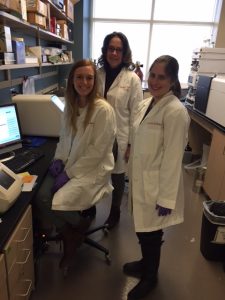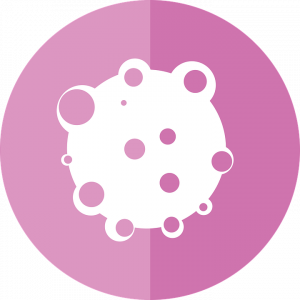In the School of Public Health, we have many talented and accomplished faculty that conduct research in addition to teaching courses! I asked my Introduction to Public Health Biology instructor, Dr. Barbara Hocevar, a few questions about her research and experiences here at IU!

Dr. Hocevar with a few members of her lab!
What is your public health background?
I have a PhD in Pharmacology and the research focus of my postdoctoral fellowship was in cancer biology. My first academic appointment was in the Department of Pharmacology & Toxicology at the IU School of Medicine in Indianapolis. I was then recruited to join a new center- the Center for Environmental Health, which was housed in the Department of Pharmacology & Toxicology. It was then that my research focus changed from a more therapeutic approach-medicine to a prevention focus-public health. My research focus is still on cancer and other chronic diseases. But rather than a focus on therapeutic intervention once a disease has been diagnosed, my research now focuses on understanding the environmental agents that cause the disease or that contribute to disease pathology. Once we have that understanding, then preventative measures can be put in place.
What research are you currently working on?
Our long-term research goal is to identify key biological pathways that are targeted by environmental toxicants and lead to the development and/or progression of pancreatic cancer. Pancreatic cancer is the fourthleading cause of cancer deaths and one of the most lethal forms of cancer diagnosed in the United States. Despite advances in understanding the underlying mechanisms driving disease progression, median survival time following diagnosis is less than 6 months, with a five year survival rate of less than 6%. Several risk factors have been identified as potential contributors to pancreatic cancer development and progression, including environmental and lifestyle factors, such as smoking, drinking and
 diet, medical conditions such as diabetes and pancreatitis, and exposure to environmental chemicals. One potential environmental chemical that could be important in the pathogenesis of chemically-induced pancreatic cancer is perfluorooctanoic acid (PFOA). PFOA is used in the manufacture of a wide array of industrial and commercial products, such as Teflon and Scotchguard. In rodents, chronic exposure to PFOA induces liver, Leydig and pancreatic acinar cell tumors (PACTs). In humans, epidemiologic studies have linked PFOA exposure to adverse chronic health effects including several types of cancer. PFOA has been detected in essentially all of the American population, with mean serum levels close to 4 ng/ml and a predicted half-life of ~4 yrs. The widespread human exposure to the carcinogenic PFOA, coupled with its biological persistence, suggest that it could be a prominent agent promoting pancreatic cancer progression. We have a current NIH grant which focuses on the promotion of pancreatic cancer elicited by PFOA exposure. In this grant, we are examining the effects of PFOA exposure on the function of pancreatic acinar cells in culture as well as determining if PFOA exposure accelerates pancreatic cancer in a genetic mouse model of pancreatic cancer. Further understanding the mechanism of how PFOA contributes to pancreatic cancer progression and at what levels of exposure this occurs will aid in the design of strategies to adequately protect the public from adverse health effects.
diet, medical conditions such as diabetes and pancreatitis, and exposure to environmental chemicals. One potential environmental chemical that could be important in the pathogenesis of chemically-induced pancreatic cancer is perfluorooctanoic acid (PFOA). PFOA is used in the manufacture of a wide array of industrial and commercial products, such as Teflon and Scotchguard. In rodents, chronic exposure to PFOA induces liver, Leydig and pancreatic acinar cell tumors (PACTs). In humans, epidemiologic studies have linked PFOA exposure to adverse chronic health effects including several types of cancer. PFOA has been detected in essentially all of the American population, with mean serum levels close to 4 ng/ml and a predicted half-life of ~4 yrs. The widespread human exposure to the carcinogenic PFOA, coupled with its biological persistence, suggest that it could be a prominent agent promoting pancreatic cancer progression. We have a current NIH grant which focuses on the promotion of pancreatic cancer elicited by PFOA exposure. In this grant, we are examining the effects of PFOA exposure on the function of pancreatic acinar cells in culture as well as determining if PFOA exposure accelerates pancreatic cancer in a genetic mouse model of pancreatic cancer. Further understanding the mechanism of how PFOA contributes to pancreatic cancer progression and at what levels of exposure this occurs will aid in the design of strategies to adequately protect the public from adverse health effects.
What is the process you typically follow to obtain funding for your research?
As my research interests fall primarily in the purview of public health and disease, the primary funding agency which applies to my research is the National Institute of Health (NIH). I routinely use the grants.gov website to search for funding announcements that fall within my research areas. In addition, private foundations are also a source for funding. In my case, several foundations fund basic pancreatic cancer research, such as the Lustgarten Foundation.
What is your favorite part about your research studies?
 As a faculty member, I have teaching as well as administrative duties that require a substantial amount of my time in any given week. However, I also spend as much time as possible on research. I most enjoy when I can spend time in the lab, either performing bench research myself, or more commonly, by guiding the research progress of lab members. The most satisfying aspect of having the privilege to have your own research lab is to be able to pass along that love of basic research to the next generation of researchers.
As a faculty member, I have teaching as well as administrative duties that require a substantial amount of my time in any given week. However, I also spend as much time as possible on research. I most enjoy when I can spend time in the lab, either performing bench research myself, or more commonly, by guiding the research progress of lab members. The most satisfying aspect of having the privilege to have your own research lab is to be able to pass along that love of basic research to the next generation of researchers.
Do you have any advice for students interested in public health research?
My advice for students interested in public health research is to become involved. Public health is an area which requires active engagement. So whatever your research interest happens to be – I would urge students to contact faculty members who might be pursuing their areas of interest to ask if they can participate in their research programs. Many departments on campus hold weekly or monthly seminar series. I would also suggest to students to attend as many seminars as possible to help identify areas of interest.
If you are interested in learning more about SPH faculty and their research concentrations, click here!

Megan Lisch
Still figuring out how this whole blogging thing works!


